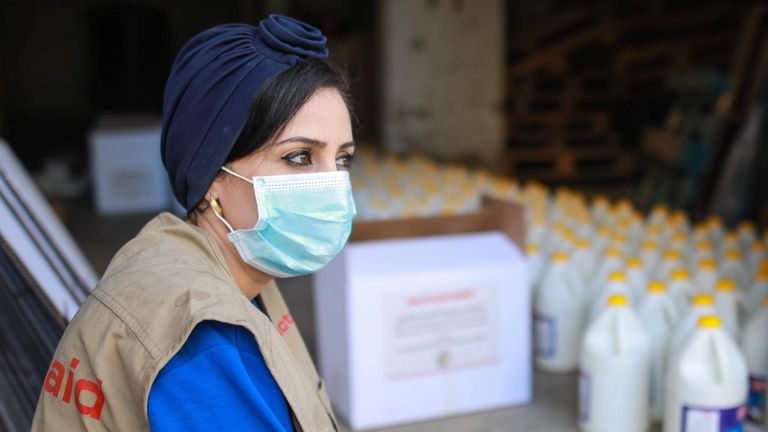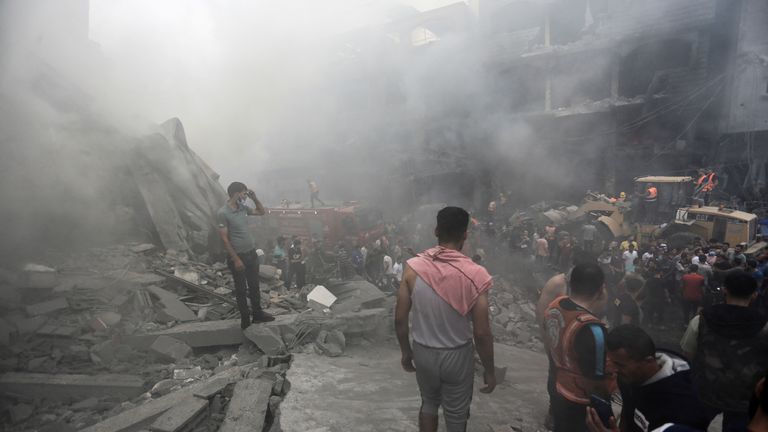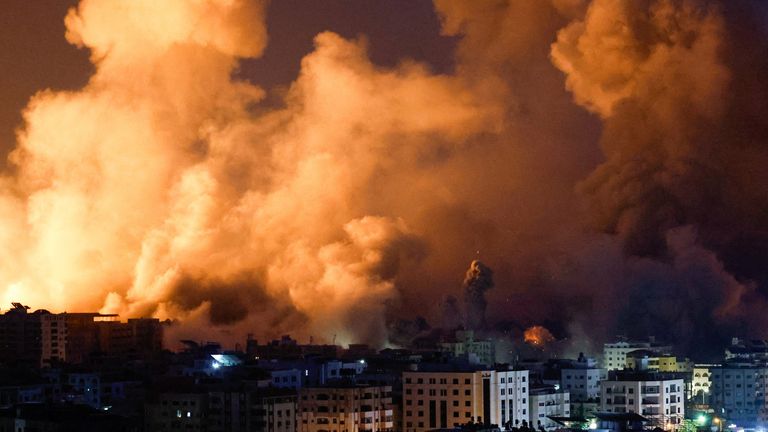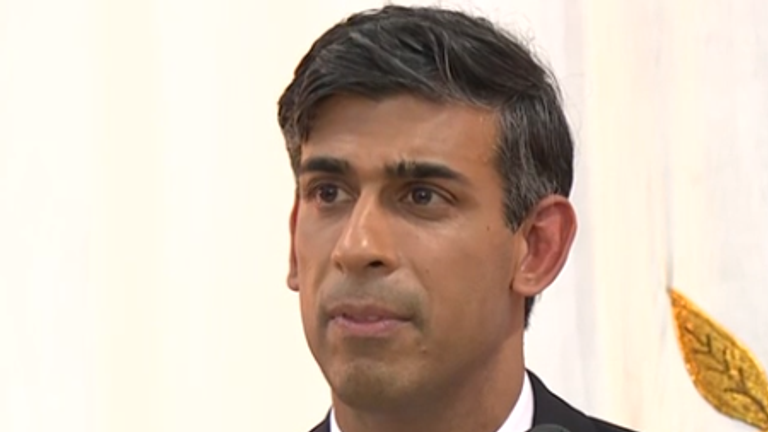
A desperate and afraid mother in the Gaza Strip has told Sky News she fears her family might not survive the night, as bombs were heard crashing in the background.
“You don’t know how we are suffering,” Samah Kassab told Sky News on the phone on Monday.
“We cannot sleep in the night, and we cannot rest during the day,” she said.
Bombing is “surrounding our home,” the programme manager for international charity ActionAid added.
Hamas militants launched a surprise attack on Israel from the Gaza Strip on Saturday. Since then, Israel declared war and pounded the area with retaliatory strikes.
Samah has been sheltering in her mother’s home, along with her 15-year-old daughter and 13-year-old son.
They stocked up on food and water before taking cover, with shelves already running close to empty.
The family cannot go outside for more supplies, for fear of being targeted or caught up in bombardments.
The Gaza Strip has already been living under some form of blockade by Israel since 2007 – restricting goods, power and free movement – following the military takeover of Gaza by Hamas.
Israel says the blockade is necessary to protect its citizens from Hamas.
Today, Israel imposed a “complete siege” on the territory, preventing food and fuel from reaching the 2.3 million people in the Gaza Strip.
At least 900 Israelis and 687 Palestinians have been killed so far in the fighting, as Israel’s forces push back into the Gaza Strip – after Hamas fighters took civilian hostages during raids over the border.
Aid organisations have today warned of a “rapidly escalating humanitarian crisis” and some told Sky News they had been forced to suspend much-needed emergency work because of the extreme danger to staff.
Read more:
Israel-Hamas war latest – as hostages threatened
How Israel was misled for months
The music festival attack and how it unfolded
Kidnapped grandmother ‘suffering every minute’
‘I am afraid’
Samah said interrupted internet access makes it difficult to check for advance warnings about the locations of the next strikes on her area.
During a 25-minute phone call with Sky News at around 3.30pm UK time on Monday afternoon, the conversation was interrupted at least four times by the sounds of bombing nearby.
Following the sound of one strike, her voice almost cracked as she said: “I am afraid.”
She added: “I am thinking about my children.
“I am thinking about it if we will be alive tomorrow or not.
“I am thinking of my relations.
“I am thinking of the internet, if I will be in connection with others.
“So many things and many thoughts in my mind.”
Sky News is not identifying her location to protect her safety.
Elsewhere, at the Jabalia refugee camp in northern Gaza, men clambered on a flattened building to pull an infant’s tiny body from the rubble, carrying it down through the still-smoking remains of bombed-out ruins.
Humanitarian agencies warn they cannot carry out normal work
Samah said her ActionAid team is unable to carry out its normal work or deliver emergency relief because conditions are too dangerous.
ActionAid said in a statement: “With Gaza now completely cut off from food, electricity, water and fuel, ActionAid is alarmed at the rapidly escalating humanitarian crisis which is affecting the lives of over two million people.”
Its country director Nadim Zaghloul said: “The situation inside Gaza is dire as homes and civilians remain the indiscriminate targets of continuous bombing.”
He added: “Our colleagues have fled their homes and are currently using hospitals as shelters.
“Air raids continue throughout the day and night and our partners are telling us that entire families have lost their lives.”
The United Nations Relief and Works Agency for Palestine Refugees (UNRWA) also told Sky News it had been forced to suspend most of its operations to keep its 13,000 workers safe.
“Our colleagues are really terrified, many have had to leave their homes themselves,” UNRWA spokesperson and director of communications, Juliette Touma, said.
Some have “stayed in their homes but are very afraid… For many of them, this is the seventh time they have lived through an escalation,” she told Sky News.
UNRWA was forced to close 280 schools, affecting more than 300,000 children, and reduce its health services to a “minimum level”.
It has also paused work at its 14 food distribution centres, because of the danger to staff and the challenges of transporting food under the blockade, leaving more than 112,000 families (541,640 individuals) without food assistance.
Already 137,000 people have fled to their schools, after they were turned into emergency shelters, which are “almost at full capacity” of 150,000, Ms Touma said.
Meanwhile, humanitarian medical charity Médecins Sans Frontières (MSF, also known as Doctors Without Borders) warned they could not use ambulances because they’re being “hit by airstrikes”.
It called on “all parties to respect the sanctity of medical facilities, vehicles and personnel”.
“Health facilities need this equipment because of the many injured patients,” Ayman al Djaroucha, MSF deputy coordinator in Gaza said in a statement.
Israeli and UK PMs condemn attacks
There is fear inside Israel, too.
Israelis have been told to prepare for a three-day stay in bomb shelters and secure rooms by the country’s defence forces.
Israel’s Prime Minister Benjamin Netanyahu said on Monday a number of Hamas gunmen are still inside the country and accused them of killing handcuffed children.
In London, Prime Minister Rishi Sunak has been showing his support for the Jewish community.
“The people who support Hamas are fully responsible for this appalling attack,” he said.
“They are not militants. They are not freedom fighters, they are terrorists.”



